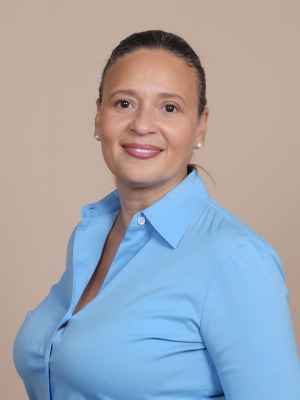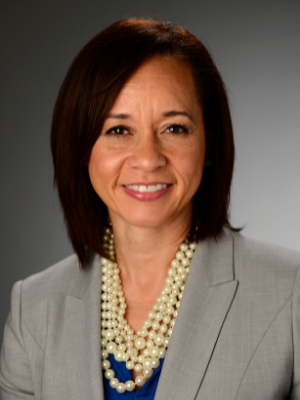 “I like to view people as generally good. Without a tool to understand when you’re doing something that causes harm, you may not even know you’re doing it,” says Rhonda Johnson. “In the corporate world, we have tools, training and social pressure to moderate our bias and behavior, but not as much in small businesses. Without a tool, how can we address it?”
“I like to view people as generally good. Without a tool to understand when you’re doing something that causes harm, you may not even know you’re doing it,” says Rhonda Johnson. “In the corporate world, we have tools, training and social pressure to moderate our bias and behavior, but not as much in small businesses. Without a tool, how can we address it?”
Johnson speaks about the unfolding of her DEI journey from Wall Street to Washington, D.C., being part of the founding team of the Consumer Financial Protection Bureau (CFPB), and launching Different Like You, Inc and the Sacki App to weave the principle of inclusion deeper into the social fabric of small businesses and our daily lives.
A Culture Change from NYC to D.C.
Growing up as a New Yorker in a diverse neighborhood, Johnson was struck by the lack of diversity when she entered into Wall Street, often as the only woman or woman of color in the room.
“Different perspectives add value to the solution. If everyone was coming from Harvard or Stanford or Ivy League schools, I felt there wasn’t enough diversity even in the way people think, because they’re trained how to think at these schools,” she recalls. “I was interested in diversity of thought and experience and felt we needed to do something different.”
At James D. Wolfensohn, Inc., a private equity firm, Johnson began recruiting at Historically Black Colleges and Universities (HBCUs), too. Quickly, she witnessed how diversity shifts the culture. She observed how bringing in people of different economic, educational, and ethnic or racial backgrounds disrupts group think and status quo approaches to problem-solving, which also introduces tension.
“At that time, nobody was confronting these questions. What does inclusion look like when you bring in different types of people if we don’t operate on the same plane?” she was asking. “How do we solve this problem?” Diversity was being addressed but inclusion was lacking. Over the years this became a nagging question.
In November 2009, during Barack Obama’s presidency, Johnson moved to Washington D.C. to work in the Office of the Under Secretary for Domestic Finance within the U.S. Treasury. Her boss Jeffrey Goldstein, then chairman at Hellman & Friedman, was nominated to the post and brought her in. She served as a review analyst for two years, during which her passion to advance inclusion increased.
“Back in New York, even though diversity was limited within financial services, I didn’t feel isolated or marginalized, as it was a melting pot. If you work in NYC you are exposed to different types of people as part of daily life. D.C. felt way more polarized. Even where people lived was very racially divided. I was frankly shocked at the difference in culture,” she notes. “It started to slowly change because people of color from across the country were moving to the area to work for Barack Obama, so more racial, ethnic, cultural and economic diversity was being infused into the DC area and the federal government.”
Johnson moved on to become a founding member of the Consumer Financial Protection Bureau (CFPB) in 2011, initially as D&I Program Analyst and then as Senior Advisor, Office of Minority and Women Inclusion, before stepping into the deputy director role as of April. Now she focuses on assessing diversity and inclusion within financial services, essentially going full circle to help financial institutions address the challenges she identified early in her career.
Why Diverse Perspectives Bring Creativity
“I am curious about people. I want to hear about your story. I want to know about you, what you’re doing, where you’re trying to go,” says Johnson. “I also want to hear your perspective about solutions we’re working on. I feel no one person has the answer, and all products and solutions can benefit from different perspectives.”
Meeting people where they are and valuing collaboration, she is a furtive gatherer and proponent of the creative value of multiple perspectives.
“So many big decisions have been made by people who were all thinking alike. I feel it’s critical to have different perspectives on solving problems, especially big problems,” says Johnson. “More than one thing can be true. I try to remind people that it doesn’t have to be either/or. It can be and. I like to consider how we can meld ideas to come up with a good solution. If there are two opposing ideas, rarely is one or both entirely wrong.”
She gives the example of a mechanic looking at a problem in the medical field. Their opinion may be invalidated because they’re not a doctor, but being outside of that frame also gives the mechanic an opportunity to see a totally different solution which the doctor may not be able to consider from his vantage point within it.
“When you have diversity of thought, I genuinely believe you open the door to much more and many creative solutions,” emphasizes Johnson. “I often think the creativity lies not necessarily in the subject matter expert, but in the person who is looking at the problem for the first time.”
Raising Her Voice To Advocate for Inclusion
Johnson has always valued giving employees a voice – through surveys with disaggregated data results, through ERGs, and diversity councils. She also had to raise her own voice to make sure that happened.
“I’ve always been that person to fight for the underdog. I don’t like unfairness,” says Johnson. “So anytime I saw unfair treatment, I was definitely always willing to speak up, even in an environment where I didn’t feel like I had a lot of power.”
Early on in her career, Johnson focused on being observant, listening, learning and working hard, not so much on her voice being heard. Until it became necessary. Compared to the NYC culture, where people were more forthright, Johnson found the culture polite and evasive in D.C.
“There was a disconnect between what people were saying and what they were willing to do,” she observed, “I take people at their word. If you say you support this, I expect your efforts to reflect that, and so when that didn’t happen, I would confront the person. I found out people weren’t used to being challenged on what they promised in this space,” she says. “So I had to find a different way than directly calling people out. That’s when I shifted my approach, I started to dive deep into the research to ensure that my colleagues could better understand the importance of diversity and inclusion initiatives being proposed, I began sharing the data behind the strategies, and working collaboratively to gain buy-in and then documenting the commitments people made. It often requires more work to help people understand the importance of equity, so it became more socially acceptable to also hold them accountable.”
Launching a Social Inclusion App
Her professional focus on DEI and the culture shock of moving from NYC to D.C. also spurred Johnson on an entrepreneurial journey. Whereas in the NYC melting pot, she could go into any restaurant and see diverse customers, when going out with friends in D.C., she often experienced being treated differently.
“People take their biases everywhere and if there’s no incentive to check them, they won’t change. We are imperfect and the result of so much we’ve experienced,” she says. “In the corporate world, we get training to check our biases. But I’m not sure that happens at small businesses, merchants, apparel shops, gift stores and restaurants. I felt there was a need for more communication around how different groups of people are being treated – whether it’s because of race, language proficiency, or size.”
She launched differentlikeyouinc.com and the Sacki App. Sacki is similar to Yelp with a diversity matching dimension. Consumers are invited to create a profile and share positive and constructive reviews on their experiences with merchants. Sacki matches consumers (based on their demographic profile) with relevant review data.
In 2015, she first began to frame out the App but then got stalled on development setbacks. During the lull of the lockdown, she decided not to watch television and found that she was re-energized in her passion for developing Sacki.
She notes, “I began to research the impacts on mental health and physical illness from the stress of life for groups of people – Hispanic people, black people, people with disabilities, obese people. All these interactions they have on a day-to-day basis cause so much stress and affect health and mortality,” she says. “How people are treated on a day-to-day basis while going about their lives has such a massive impact on our society, daily micro-aggressions result in anger, frustration, depression, that lead to decisions and behaviors that affect all of us. The goal is that everyone should be treated with dignity and respect.”
Johnson’s Sacki App will hold people accountable in smaller, less formal business settings that also contribute to day-to-day interactions. Currently, the Sacki App is in beta in Atlanta. Sacki will go national to major cities within a year and international within a couple of years. Currently, she is in the process of learning how people behave with the App and what modifications need to be made.
Dealing with development, technology and design, Johnson has been stretched by launching an App, but her entrepreneurial spirit had already been there.
“When I went to the CFPB, I had the opportunity to be super creative informing our office, our function and our role,” she says. “There was a lot of opportunity to be innovative and bold because we were just launching and building the agency.
Building A World Without Shells
“I have always been extremely sensitive, and I think I built this shell around myself because it wasn’t working for me,” she recalls, giving the example of a female colleague once stealing the idea Johnson had shared with her and presenting it to their boss. “I felt so naive. Different incidents in the work culture broke my heart. That hardened me. I didn’t trust people.”
Though part of her feels putting a guard up was necessary, she also knows operating with a survival mechanism is not the same as thriving, and she doesn’t want to do it to herself, anymore.
“What’s for you no one can ever take away. Stay true to yourself. Maintain your authenticity,” she would say she has learned through the years. “I think my authenticity is important. Sometimes you have to figure out whether you’re in the right spaces for who you are, who you truly are,” she muses. “Without the shell, I may not have survived in certain environments. Being authentic may lead you to different places and even doing different things. It sounds cliche but I think people should follow their heart.”
Now Johnson is expanding into more of who she truly is while enjoying the culture and nature of Washington D.C., too. The Sacki App, based on inclusion, is her way of trying to impact the world so people can be who they are everywhere they go.
By: Aimee Hansen

